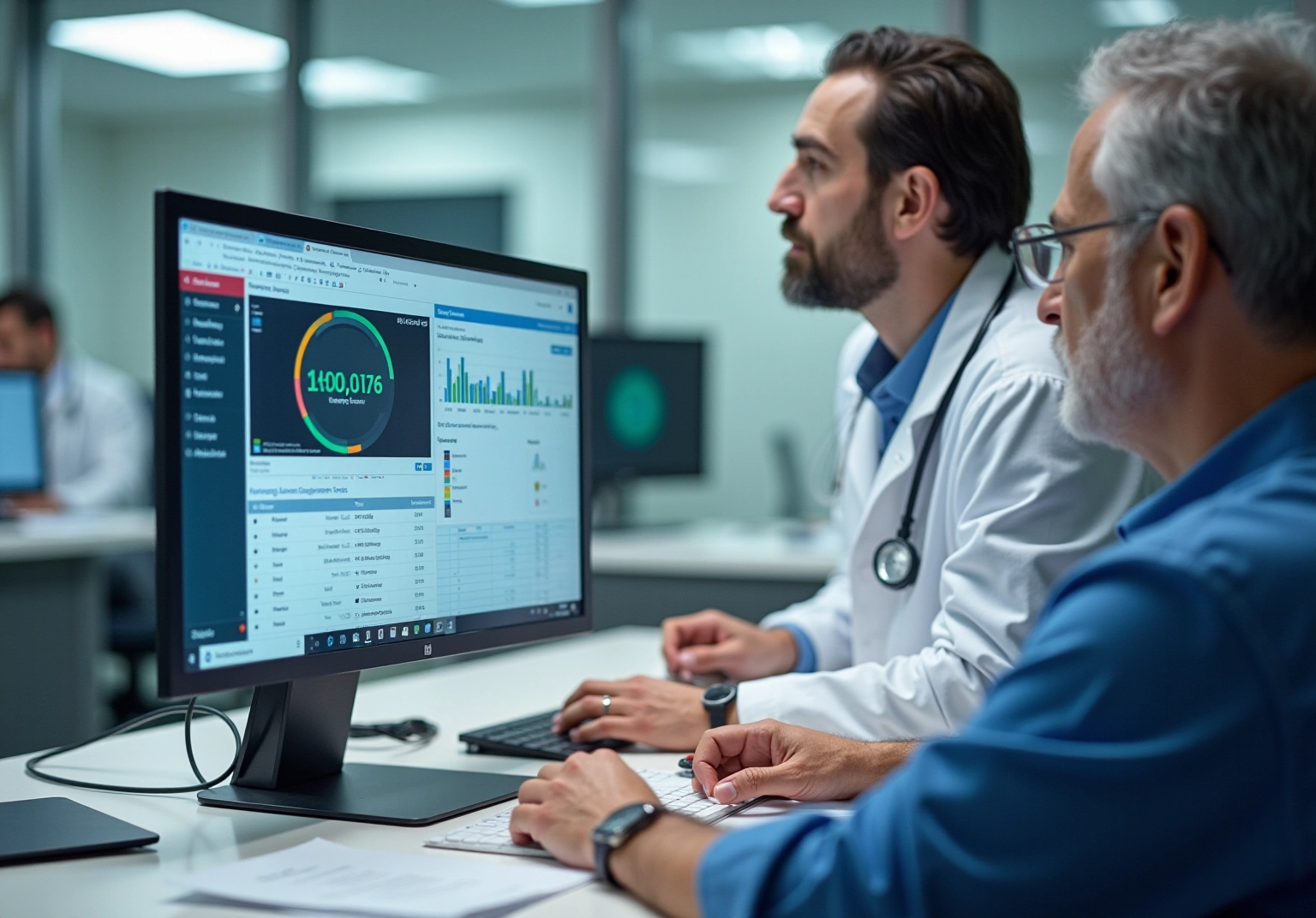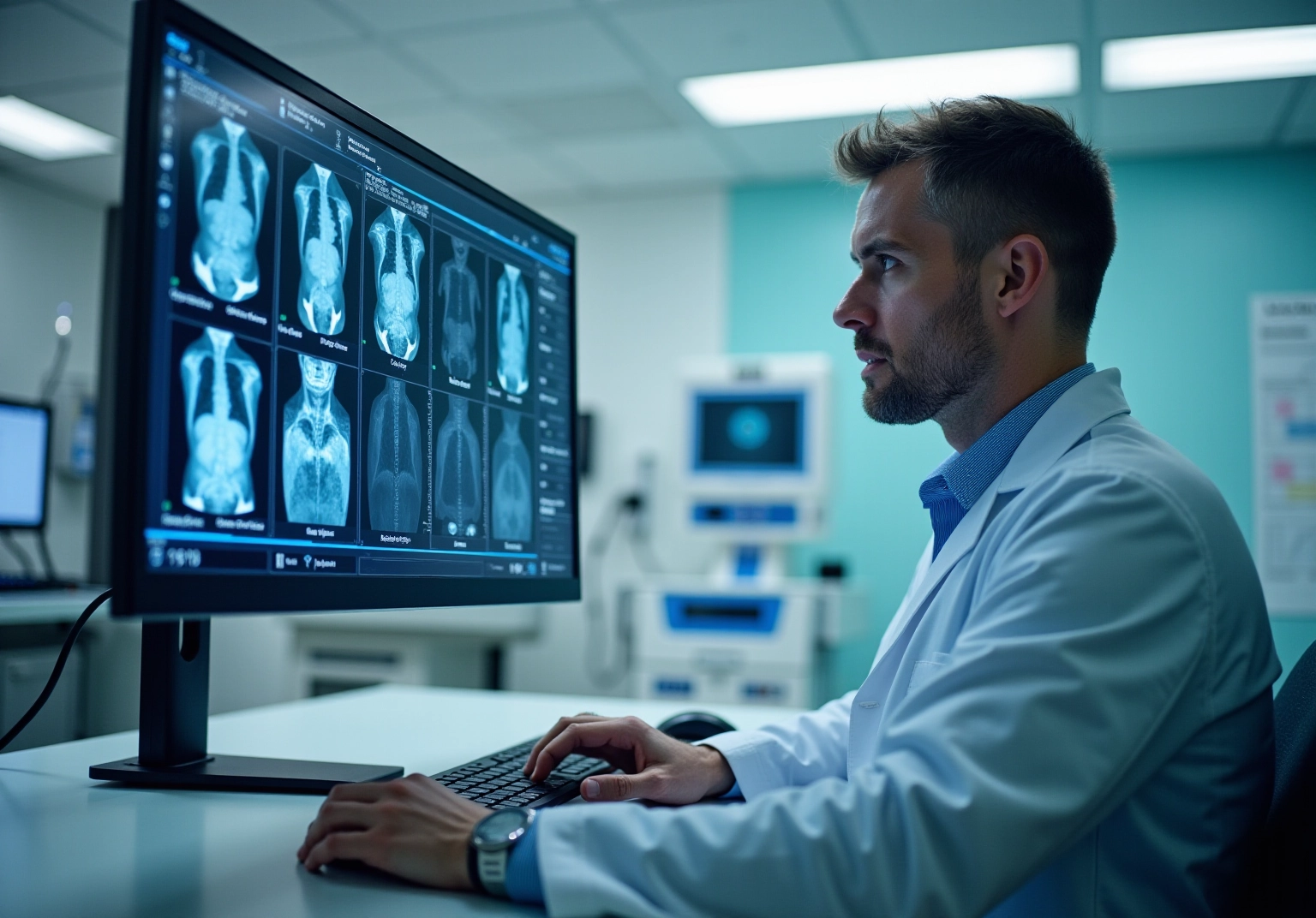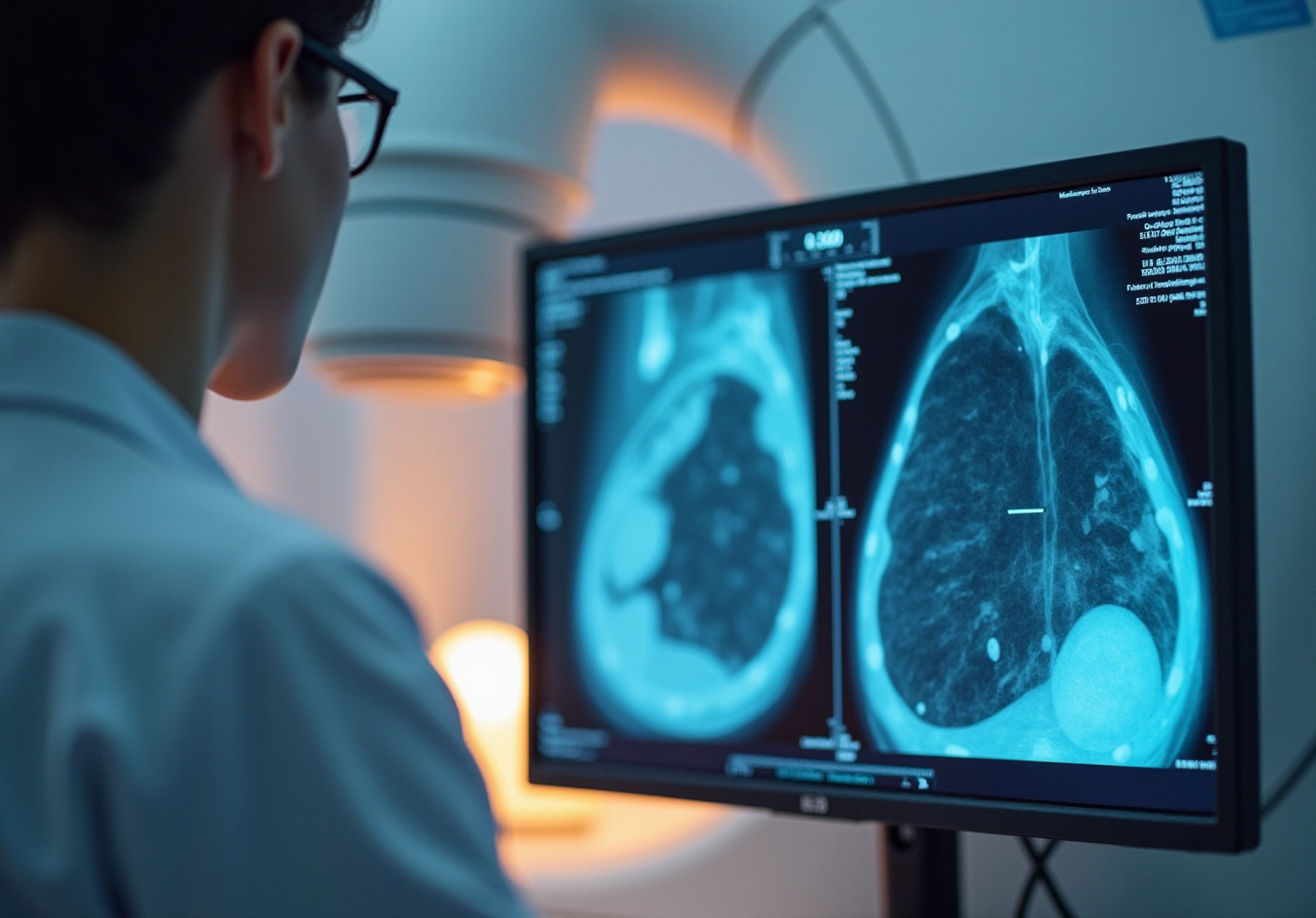
The article delves into the transformative applications of AI in medicine, particularly focusing on ten specific innovations that significantly enhance diagnostics, streamline operations, and improve patient outcomes. By leveraging AI-powered imaging for early disease detection and automated coding systems, it becomes evident how AI not only boosts efficiency and accuracy within medical practices but also addresses critical healthcare challenges. Ultimately, these advancements pave the way for better patient care and operational improvements, underscoring the vital role of AI in modern healthcare.
The integration of artificial intelligence in healthcare transcends mere trend; it serves as a transformative force reshaping patient care. By enhancing diagnostic accuracy and streamlining administrative processes, AI applications are revolutionizing the medical landscape, presenting unprecedented opportunities for improved outcomes. Yet, as these technologies advance, they bring forth challenges that provoke questions about reliability and ethical implications. How can healthcare providers harness the power of AI while ensuring that patient care remains paramount? This article delves into ten groundbreaking applications of AI in medicine that are establishing new standards in patient care and operational efficiency.
The challenge of accurately classifying Hierarchical Condition Categories (HCC) can significantly impact healthcare providers. The Inferscience HCC Assistant addresses this issue by utilizing advanced AI algorithms, which are among the key applications of AI in medicine to automate the classification process. Effortlessly connecting with electronic health records (EHRs), it conducts real-time gap analysis on claims data, recommending HCC codes that may have been overlooked by other providers or the primary healthcare provider in the previous calendar year.
This innovative tool enhances coding precision while ensuring compliance with Medicare Advantage regulations—an essential factor for optimizing Risk Adjustment Factor (RAF) scores and securing increased funding for care. By streamlining operational workflows, the HCC Assistant allows medical professionals to dedicate more time to client interactions rather than administrative tasks, thus improving overall service quality.
Inferscience’s commitment to data security, exemplified by their SOC2 Type II certification, positions them as a reliable partner in the medical sector. Their solutions not only provide efficiency but also ensure compliance. By consolidating individual data and minimizing manual coding discrepancies, the HCC Assistant reshapes HCC coding processes, which exemplifies the applications of AI in medicine to alleviate administrative burdens for providers.
To witness the HCC Assistant in action and explore how it can transform your organization, we encourage you to request a demo.

IBM Watson Health employs applications of AI in medicine to transform medical operations by analyzing large datasets, revealing inefficiencies, and improving decision-making. This innovative technology empowers medical organizations to enhance resource distribution, simplify workflows, and elevate care for individuals. By integrating AI into their systems, providers can effectively manage client data, predict outcomes, and ensure compliance with medical regulations, ultimately leading to enhanced operational efficiency and increased client satisfaction.
For instance, organizations utilizing predictive analytics have reported up to a 50% reduction in hospital readmissions. Moreover, 92% of leaders in the medical field recognize the applications of AI in medicine and the potential of generative AI to enhance efficiencies, underscoring the growing reliance on AI-driven insights in shaping strategies for the sector.
Inferscience’s HCC Assistant exemplifies the effectiveness of AI in improving accuracy in medical documentation and maximizing funding from Medicare Advantage beneficiaries. By consolidating individual data through advanced NLP tools that seamlessly integrate with EHR systems, Inferscience significantly enhances HCC coding efficiency and streamlines risk adjustment workflows, ultimately leading to improved medical outcomes and optimized Medicare reimbursements.
As AI continues to evolve, the applications of AI in medicine are expected to lead to substantial advancements in both client care and operational efficiency, alongside a steadfast commitment to data protection and compliance, as evidenced by Inferscience’s SOC2 Type II certification.

Google Health is at the forefront of revolutionizing diagnostics through the applications of AI in medicine with its AI-powered imaging solutions. By harnessing advanced machine learning algorithms, Google Health significantly enhances the applications of AI in medicine, particularly in improving the accuracy of medical imaging, which facilitates earlier detection of critical diseases, including cancer.
These AI tools meticulously analyze imaging data, revealing patterns that may elude human observers, demonstrating the applications of AI in medicine to improve diagnostic precision. Notably, the applications of AI in medicine, such as AI-assisted imaging analysis, have been shown to enhance early-stage cancer detection rates by 28%, leading to a remarkable 43% increase in five-year survival rates for individuals diagnosed using these methods.
Furthermore, the applications of AI in medicine show an impressive accuracy of 94.5% in detecting breast cancer, compared to 88.4% for human radiologists. The applications of AI in medicine enhance precision, empowering medical professionals to make more informed decisions while ensuring adherence to clinical guidelines, ultimately resulting in better outcomes for patients.
Radiologists have recognized the applications of AI in medicine as an invaluable assistant, particularly during high-demand periods, helping to identify subtle findings that might otherwise be missed. As one radiologist aptly noted, “AI has become an essential tool in our practice, enhancing our ability to detect conditions early and accurately.”
However, it is essential to acknowledge the challenges that AI faces, including biases in training data and the need for external validation to ensure reliability across diverse patient populations. As AI technology continues to advance, the applications of AI in medicine, especially in medical imaging, are set to redefine standards of care and enhance the overall efficiency of medical services.
The applications of AI in medicine are revolutionizing radiology diagnostics by automatically analyzing medical images and prioritizing critical findings for radiologists. This innovative approach significantly enhances the speed and precision of diagnoses, enabling medical providers to respond swiftly to urgent cases. For example, an AI triage system implemented across 15 hospitals processed over 650,000 X-rays in its inaugural year, reducing critical finding reporting delays by an impressive 91% and potentially averting numerous adverse events. Such results underscore the indispensable role of AI in urgent case management.
The applications of AI in medicine not only streamline workflows in radiology departments but also alleviate the administrative burden on radiologists. By automating routine tasks, AI ensures adherence to diagnostic standards while bolstering overall operational efficiency. Radiologists have reported that having draft reports available prior to their review offers actionable data points that can be swiftly acted upon, particularly in emergency situations. This capability facilitates a turnaround time of less than 10 minutes for positive cases marked as urgent, resetting expectations for diagnostic speed.
Moreover, AI tools have enhanced productivity by up to 40% without compromising accuracy. As the demand for radiology services continues to escalate, with projections indicating a shortage of up to 42,000 radiologists by 2033, the applications of AI in medicine emerge as a crucial ally in managing backlogs and expediting result delivery. The future of radiology will likely entail a collaboration between human expertise and AI, fundamentally transforming medical service provision and improving outcomes for patients.

Zebra Medical Vision addresses a critical challenge in healthcare: the need for early disease detection. Utilizing advanced AI imaging insights, the company transforms the landscape of diagnostics, significantly improving outcomes for individuals. By meticulously analyzing medical images, their AI algorithms can pinpoint potential health issues before they escalate, facilitating timely interventions. This proactive approach not only enhances the quality of service but also ensures compliance with medical regulations aimed at improving patient safety and results.
The effectiveness of this technology is underscored by impressive statistics; AI systems have demonstrated diagnostic accuracy rates exceeding 95% in certain conditions. Such accuracy highlights the transformative potential of AI in diagnostic practices. Zebra’s innovative technology showcases the applications of AI in medicine, illustrating how it can empower medical providers to offer effective preventive care, ultimately resulting in improved health outcomes and decreased medical expenses. By adopting these solutions, healthcare professionals can not only enhance patient care but also optimize operational efficiencies, underscoring the applications of AI in medicine, especially in medical imaging.
Inferscience is revolutionizing medical risk adjustment by harnessing artificial intelligence to significantly enhance HCC classification accuracy. Our AI-driven solutions empower medical providers to streamline risk adjustment workflows, effectively eradicating human error and optimizing Medicare Advantage funding. This cutting-edge technology not only accelerates the programming process but also guarantees that patient health information is managed with precision, enabling providers to make informed financial decisions promptly. As a result, medical outcomes improve, and adherence to regulatory standards strengthens, ensuring that classification practices meet the highest quality benchmarks.
Customer testimonials highlight the effectiveness of Inferscience’s HCC coding solutions in streamlining processes, while industry experts emphasize that AI can substantially enhance coding precision, further underscoring its critical role in modern medical practice. Moreover, model calculations suggest potential cost savings of $12.4 million for medical centers over five years, illustrating the financial benefits of adopting Inferscience’s AI solutions. This compelling evidence positions Inferscience as a leader in the field, ready to meet the challenges faced by healthcare providers today.

Tempus leverages AI-powered data analysis to customize treatment plans based on unique genetic and clinical profiles. This innovative approach addresses a critical challenge in healthcare: the need for personalized therapies. By combining extensive clinical and molecular datasets, Tempus empowers medical providers to identify the most effective therapies for individual patients. Such customization not only enhances treatment effectiveness but also ensures compliance with regulations aimed at improving health outcomes.
Notably, studies indicate that personalized approaches in chronic disease management can lead to a 30% reduction in cardiovascular events, underscoring the potential for significant health improvements. Furthermore, the integration of advanced database management systems is essential for maintaining compliance and enhancing efficiency in medical operations.
Tempus exemplifies the applications of AI in medicine, demonstrating how AI is transforming treatment methodologies and ultimately elevating the standard of care for patients in modern medical environments.

Access to medical care remains a significant challenge, particularly for marginalized communities. Babylon Health addresses this pressing issue through AI-driven virtual services, which exemplify the applications of AI in medicine that markedly enhance healthcare accessibility. By offering telehealth consultations and AI-driven symptom checkers, Babylon empowers individuals to obtain timely medical advice without the necessity of in-person visits. This innovative model not only fosters individual engagement but also effectively mitigates healthcare disparities, ensuring essential services reach those who need them most.
For instance, the applications of AI in medicine, such as those provided by Babylon, play a crucial role in identifying gaps in treatment, including overlooked screenings for diabetes or necessary follow-up appointments for mental health services. These interventions can profoundly influence health outcomes for individuals, demonstrating the tangible benefits of leveraging technology in healthcare. Furthermore, with a steadfast commitment to compliance, Babylon ensures its virtual offerings adhere to regulatory standards, thereby enhancing the overall quality of service provided to individuals.
Notably, studies reveal that telehealth has evolved into a vital resource, with 63.3% of Medicaid enrollees receiving care they otherwise would not have accessed. This statistic underscores the critical role of AI, particularly the applications of AI in medicine, in bridging gaps in healthcare access and positions Babylon Health as a leader in the industry committed to transforming healthcare delivery.
CureMetrix addresses a critical challenge in women’s health: the accuracy of mammography readings. By employing advanced AI technology, they significantly enhance the applications of AI in medicine, particularly for early detection of breast cancer. Their sophisticated algorithms meticulously analyze mammogram images, identifying subtle abnormalities that human radiologists might overlook. This innovation not only reduces false positives and unnecessary biopsies but also aligns with compliance standards in breast cancer screening.
The integration of AI exemplifies its vital role in improving diagnostic accuracy, showcasing the applications of AI in medicine, ultimately enhancing outcomes for individuals and reinforcing the importance of precise detection in the fight against breast cancer.

Inferscience harnesses AI-enhanced functionalities within its electronic health record (EHR) solutions, significantly elevating the management of individuals, particularly in HCC classification. By automating administrative tasks and delivering actionable insights, Inferscience empowers medical providers to enhance workflow efficiency and elevate service quality. The AI-driven functionalities not only mitigate manual coding inconsistencies but also streamline documentation processes, ensuring compliance with medical regulations and enhancing risk adjustment accuracy.
Moreover, the integration of advanced NLP tools facilitates the consolidation of individual data, addressing service gaps with greater efficiency. This innovative approach exemplifies the transformative potential of applications of AI in medicine within EHR systems, allowing medical professionals to focus more on delivering high-quality service.
For example, healthcare organizations leveraging Inferscience’s AI solutions for predictive analytics have reported a remarkable 30% increase in Medicare reimbursements, alongside a significant reduction in care gaps. This underscores the concrete benefits of the applications of AI in medicine within patient management workflows.

The integration of artificial intelligence within the medical field is reshaping patient care and operational efficiency in unprecedented ways. By leveraging advanced algorithms and data analytics, various applications of AI in medicine are enhancing diagnostic accuracy, streamlining administrative processes, and personalizing treatment plans. This transformative technology not only alleviates the burdens faced by healthcare providers but also significantly improves patient outcomes, demonstrating its critical role in modern healthcare.
Throughout the article, several key applications of AI have been highlighted, including:
Each example underscores the potential of AI to revolutionize healthcare practices, from early disease detection to optimizing patient management through enhanced EHR solutions. These advancements not only promise better healthcare delivery but also ensure compliance with regulatory standards, ultimately leading to a more effective and efficient healthcare system.
As the landscape of healthcare continues to evolve, embracing AI technologies is essential for overcoming current challenges and unlocking new opportunities for patient care. The applications of AI in medicine are not merely trends but vital components of a future where healthcare is more accessible, personalized, and efficient. Stakeholders in the medical community are encouraged to explore these innovations and consider how they can integrate AI into their practices to improve both patient outcomes and operational workflows. The time to act is now, as the benefits of AI in medicine can lead to a healthier future for all.